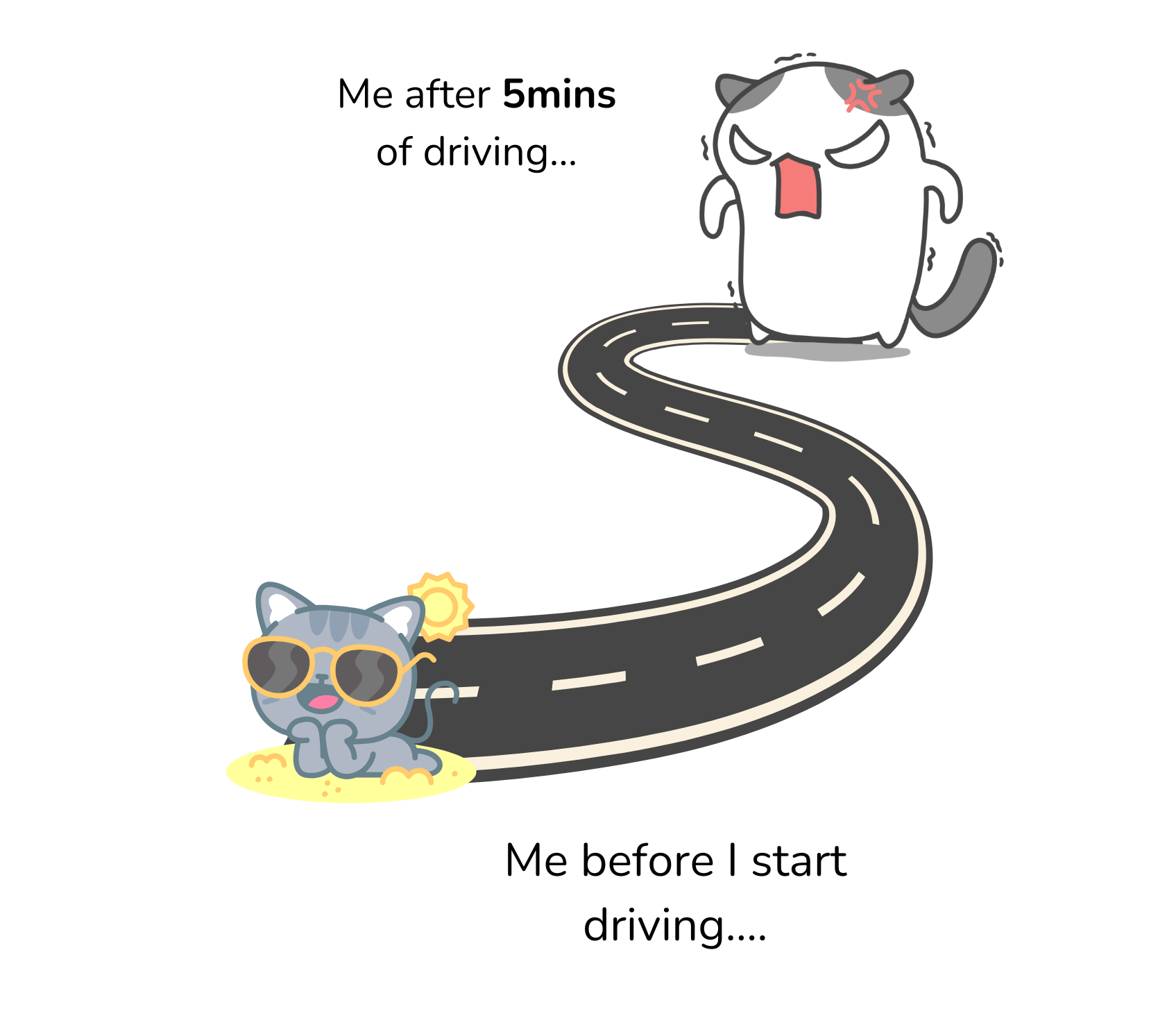Why We Transform Behind the Wheel
Discover the why people seem to change whenever they drive! Let's explore the psychology behind your behaviours to understand and help you and your loved ones manage road rage.

Transformation on the Driver's Seat
Remember The Strange Case of Dr. Jekyll and Mr. Hyde? To refresh your mind, Dr. Jekyll and Mr. Hyde is a classic tale about a respected doctor who creates a potion that transforms him into his evil alter ego, highlighting the struggle between good and evil within a single person. Jekyll is a kind and respected English doctor struggling with repressed evil urges, eventually transforming into Hyde.
Why do so many of us seem to develop alter egos when we get behind the wheel? It's like we're all starring in our own version of 'Dr. Jekyll and Mr. Hyde: The Highway Edition.' One minute we're calm, rational beings, and the next we're unleashing our inner Hyde.
Picture this: You're cruising along, jamming to your favorite tunes, when suddenly - BAM! - someone cuts you off. In that moment, it's like your brain does a 180. You're no longer the mild-mannered John from accounting; you're a raging road warrior on a mission! This transformation isn't just in your head (well, actually, it is, but in a scientific way). When we hop behind the wheel, our brains shift gears faster than a Formula 1 pit crew. The question is: can we keep our Hyde in check, or will we let him take the wheel?
The Neuroscience of Road Rage
During complex driving tasks, our brain lights up like a neural disco ball. Different areas start flashing as we navigate traffic:
- The visual-processing areas (occipital cortex and parietal lobes) in the back are like, "Watch out for that car!"
- The decision-making prefrontal cortex (prefrontal cortex, particularly the dorsolateral prefrontal cortex and ventrolateral prefrontal cortex) up front is shouting, "Should we brake or swerve?"
- And somewhere in between, your emotional centers (amygdala and anterior cingulate cortex) are going, "OMG, did you see what that jerk just did?!"
This cognitive cocktail can lead to some pretty wild behavior. Suddenly, you're channeling your inner Vin Diesel from the movie "Fast and Furious"!
Freud, Jung, and Your Fury on the Freeway
Now, let's get a little deep (don't worry, I promise it'll be fun). Remember Freud and Jung from your Psych 101 class? Well, they've got some interesting things to say about your road rage.
Freud talked about the id, ego, and superego. When you're driving, it's like your id (the impulsive, pleasure-seeking part of you) grabs the wheel. As Freud put it, "The id contains everything that is inherited, that is present at birth, is laid down in the constitution—above all, therefore, the instincts." So, when someone cuts you off, your id is like, "Oh no they didn't! Let's tailgate them!" Meanwhile, your ego (the rational part) is trying to be the voice of reason: "Now, now, let's not do anything crazy." And your superego (the moral part) is in the backseat going, "What would your mother say if she saw you driving like this?"
Jung, on the other hand, talked about the "shadow self" - those parts of ourselves we usually keep hidden. When we're driving, it's like our shadow self gets a hall pass. Suddenly, the nicest people can turn into aggressive drivers. As Jung said, "The shadow is a tight passage, a narrow door, whose painful constriction no one is spared who goes down to the deep well."
The Long-Term Effects of Driving Alter Egos
While venting frustration on the road might feel cathartic in the moment, it can have long-term consequences for your mental health:
- Chronic (Long-term) Stress : Constantly engaging in road rage can elevate stress levels over time.
- Anxiety: Repeatedly reliving anger-inducing driving incidents (a.k.a. anger rumination) can lead to heightened anxiety.
- Depression: Persistent frustration and feelings of helplessness while driving may contribute to depressive symptoms.
"Anger gets you into trouble; ego keeps you there." —Wealth of Words
Taming Your Traffic Alter Ego
Recognizing your traffic alter ego is the first step toward managing it. Here are some practical strategies:
1. Plan Ahead
Running late is one of the biggest triggers for road rage. Give yourself extra time to reach your destination so delays don’t feel catastrophic.
2. Practice Mindfulness
Mindfulness techniques like deep breathing or grounding exercises can help calm your nerves. Try taking five deep breaths when someone cuts you off instead of slamming the horn.
3. Reframe Your Thoughts
Instead of assuming other drivers are out to get you (hello, fundamental attribution error), try giving them the benefit of the doubt. Maybe they’re distracted by their kid crying in the back seat or rushing to an emergency.
"That guy who didn’t signal? Maybe he’s late for his bubblegum machine license renewal!"
4. Use Calming Music
Listening to soothing music instead of aggressive talk radio or high-energy playlists can help keep your mood in check while driving.
Trust me it works! I swapped my mom's usual radio channel to my favourite Cafe Spotify playlist during our commute—and suddenly she's waving people into her lane like she's hosting a red-carpet event.
5. Seek Professional Help if Needed
If road rage is a frequent issue, consider anger management programs or therapy options like Cognitive Behavioral Therapy (CBT). These approaches can help identify triggers and teach coping strategies tailored to your needs.
Takeaway
Remember, we're all just trying to get somewhere safely. As Freud noted, "Where id was, there ego shall be." By becoming more aware of our traffic alter egos, we can work towards integrating these hidden aspects of ourselves, creating a more balanced and mindful driving experience.
So next time you're on the road, keep smiling and remember: your car might be a personal bubble, but the road is a shared space. Let's make it a fun, safe journey for everyone! Stay Safe!

